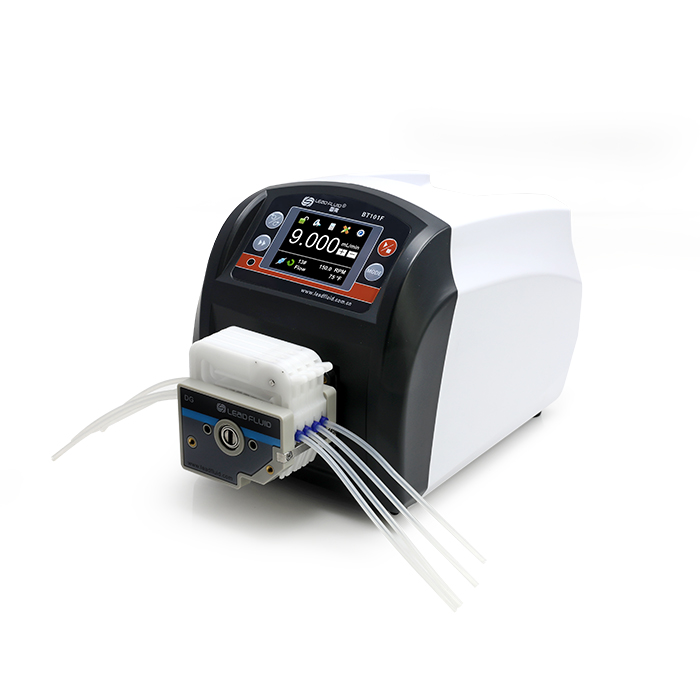Known for their gentle, precise fluid handling capabilities, peristaltic pumps have become indispensable tools in lab research, industrial processes, and medical applications. Among the various peristaltic pumps available, micro peristaltic pumps, lab peristaltic pumps and stepper peristaltic pumps stand out for their unique features and applications, providing unparalleled accuracy, versatility and reliability in fluid handling tasks.

Micro Peristaltic Pump: Micro Precision
Micro peristaltic pumps are designed to provide precise fluid handling in miniature sizes, making them ideal for applications that require precise metering of small volumes of liquid with superior control and precision.Here are some advantages and features:
- Compact design: Micro peristaltic pumps feature compact dimensions that allow integration into space-constrained environments such as microfluidic devices, analytical instruments, and medical equipment.
- High precision: Despite the small size of these pumps, they can precisely control flow and dose volumes, allowing researchers and engineers to achieve repeatable results in microscale experiments.
- Low flow rates: Miniature peristaltic pumps are capable of delivering ultra-low flow rates, making them suitable for applications such as microfluidic mixing, drug delivery, and microliter or nanoliter scale chemical synthesis.
- Versatility: Micro peristaltic pumps are compatible with a variety of tubing materials and sizes, allowing users to handle a variety of fluids, including aqueous solutions, organic solvents, and viscous liquids.
Application:
- Microfluidics: Microperistaltic pumps play a vital role in microfluidic systems, enabling precise fluid control in lab-on-a-chip devices, point-of-care diagnostics, and microscale chemical reactions.
- Biotechnology: In biotechnology and life science research, these pumps are used in cell culture perfusion, microinjection, and biomolecule analysis to facilitate controlled fluid exchange and manipulation at the cellular level.
- Medical devices: Micro peristaltic pumps are integrated into medical devices such as infusion pumps, drug delivery systems, and wearable sensors to enable precise drug dosing and continuous monitoring of physiological parameters.
lab Peristaltic Pumps: Versatile Fluid Handling Solutions
Lab peristaltic pumps are versatile fluid handling devices widely used in lab research, providing precise and contamination-free fluid transfer for a variety of applications.
Features and Benefits:
- Contamination-Free Operation: Lab peristaltic pumps feature a peristaltic pumping mechanism that eliminates the risk of fluid contamination because the fluid only comes into contact with the tubing, ensuring sample integrity and purity.
- Wide flow range: These pumps offer a wide range of flow rates, from microliters to liters per minute, allowing researchers to easily handle fluids of varying viscosities and volumes.
- Easily change tubes: Quick, tool-less tube changes enable seamless switching between different fluids or applications, minimizing downtime and ensuring workflow efficiency.
- Precise Control: Lab peristaltic pumps provide precise control of flow rates and dose volumes, enabling precise sample preparation, chromatography and liquid handling tasks in lab
Where is Lab Peristaltic Pump usually used ?
- Liquid Handling: Lab peristaltic pumps are used in analytical chemistry, biochemistry, and molecular biology laboratories for a variety of liquid handling tasks, including sample dilution, reagent addition, and buffer exchange.
- Chromatography: In chromatographic separations, these pumps serve as reliable and precise solvent delivery systems for high performance liquid chromatography (HPLC), ion chromatography and affinity chromatography applications.
- Bioprocessing: Lab peristaltic pumps are used in bioprocess development and biomanufacturing for cell culture media perfusion, fermentation feed, and product harvesting, enabling scalable and reproducible bioproduction processes.
Stepper Peristaltic Pumps: Advanced Control for Industrial Applications
Stepper peristaltic pumps combine the precision of stepper motor technology with the gentle fluid handling of a peristaltic pump to provide advanced control and versatility for industrial fluid handling tasks.
What are the advantages of Stepper Peristaltic Pumps?
- Stepper Motor Control: Stepper peristaltic pumps utilize stepper motor technology to precisely control pump speed and rotation, allowing for precise dosage and flow regulation under a variety of operating conditions.
- Programmable Operation: These pumps feature a programmable control interface that enables users to define complex pumping protocols including multi-step gradients, pulsatile flow profiles, and automated dispensing sequences.
- Feedback control: Some stepper peristaltic pumps employ feedback control mechanisms, such as encoder feedback or load sensing, to monitor and adjust pump performance in real time for optimal fluid handling.
- INDUSTRIAL DURABILITY: Designed for industrial environments, stepper peristaltic pumps are constructed from rugged materials and feature a rugged sealing mechanism to ensure reliable operation under harsh conditions.
Applications of Stepper Peristaltic Pumps
- Chemical Processing: Stepper peristaltic pumps are used in the chemical processing industry to meter and dose reagents, catalysts and additives in manufacturing processes such as pharmaceutical synthesis, food and beverage production, and water treatment.
- Automated liquid handling: In automated lab systems and robotic platforms, these pumps serve as precise and reliable fluid handling components for sample preparation, assay development and high-throughput screening applications.
- Process Control: Stepper peristaltic pumps are integrated into industrial process control systems to continuously monitor and regulate fluid flow rates, pressures and temperatures in manufacturing operations that require precise fluid handling.
Micro peristaltic pumps, lab peristaltic pumps and stepper peristaltic pumps represent versatile and innovative solutions for various fluid handling applications in lab research, industrial manufacturing and medical technology. Whether in micro-experiments, lab workflows or industrial processes, these pumps provide unparalleled precision, reliability and control, allowing researchers, engineers and manufacturers to confidently and efficiently achieve optimal results in fluid handling tasks .